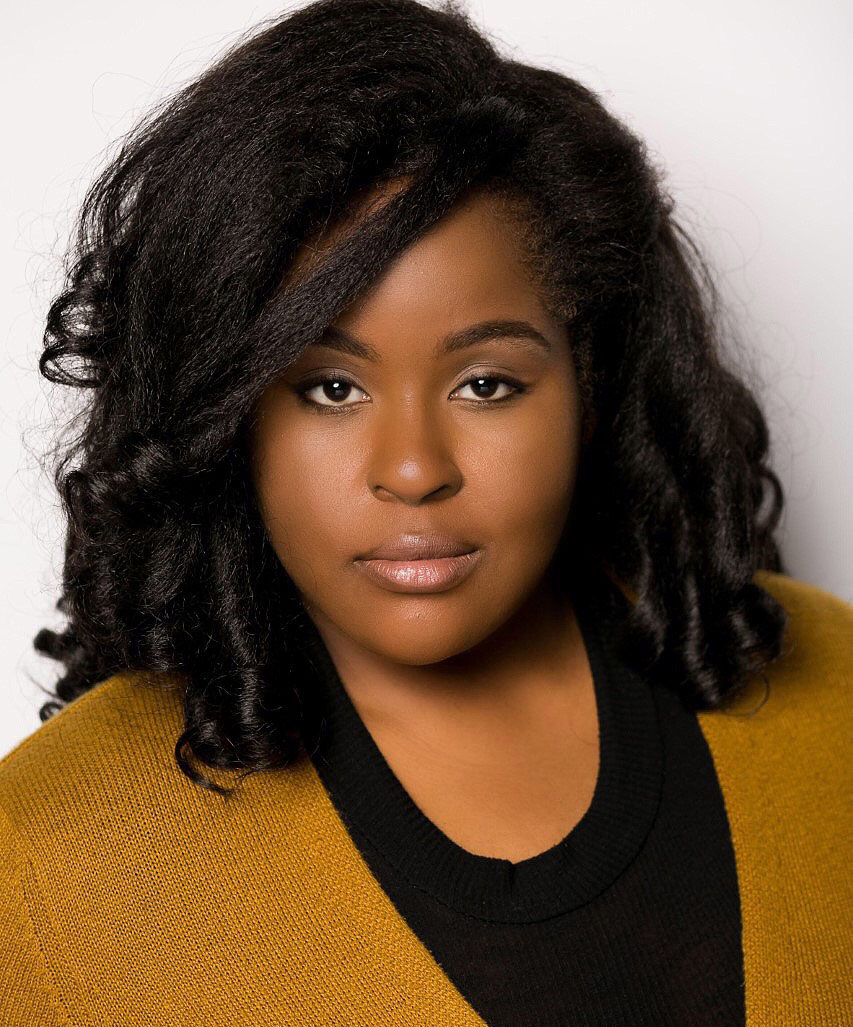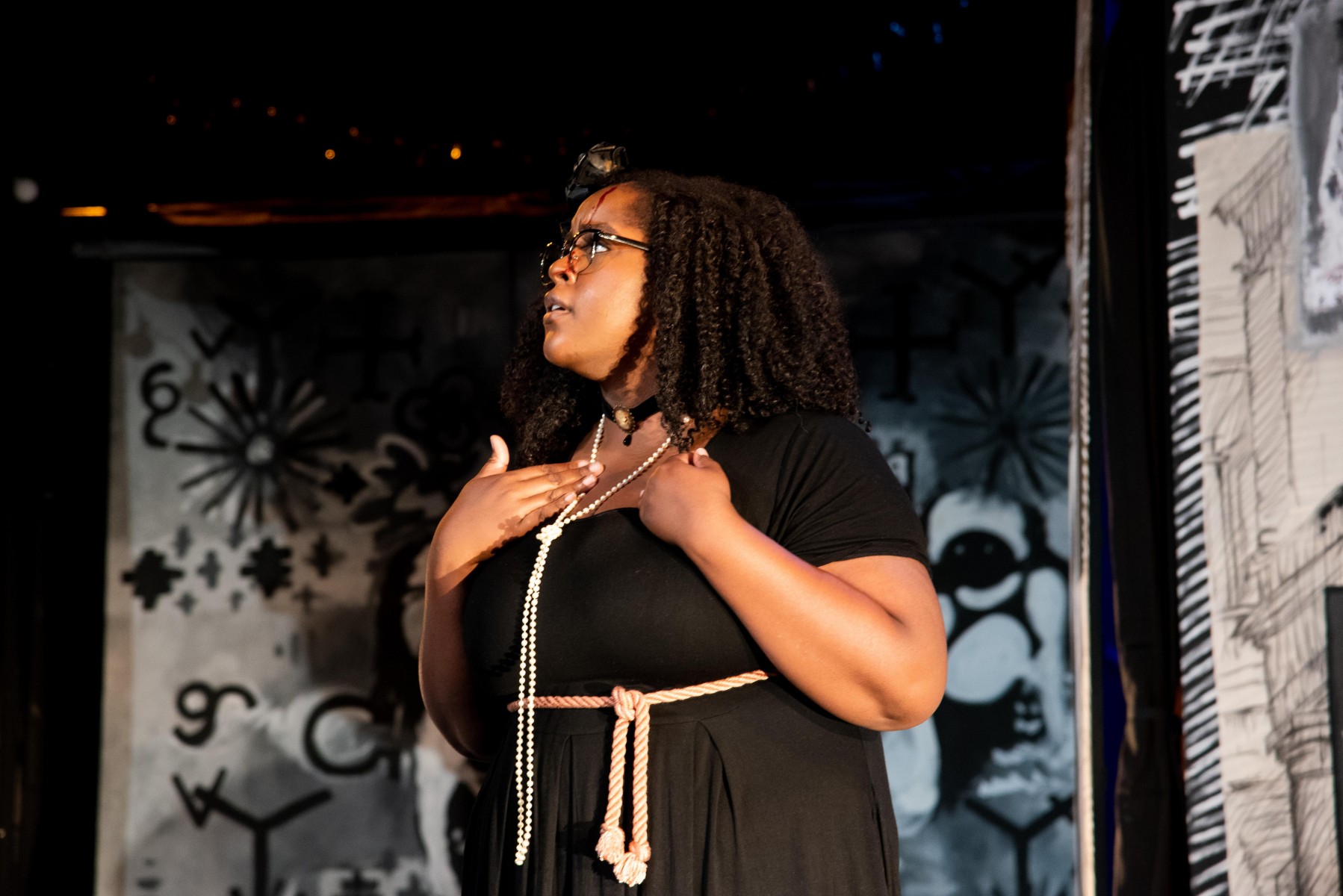By Kathleen Sanchez | Cal State LA College of Arts & Letters News Service
We had the opportunity to sit down and chat with MFA student Te’Juana Johnson about the Obie award-winning play, “Funnyhouse of a Negro” by Adrienne Kennedy, recently produced by the Department of Theatre and Dance. The one-act play is an abstract exploration of the psyche of a young Black woman as she struggles with her sense of identity in a world where race is all-defining.
In this interview, Te’Juana shares with us the life experiences that led her to choosing this play for her MFA thesis project while also discussing the racial complexities that inspired the play’s psychological symbols and structure.
Q: Thank you for sitting down with us for this interview Te’Juana. Can you share a little bit about what life experiences you feel led you to this stage? Why Adrienne Kennedy's Funnyhouse of a Negro?
A: When I was approached to select a show for my MFA thesis, as a Black artist I knew I wanted to pick a show that centered around Black and African American individuals. Funnyhouse of a Negro is a piece that is often studied more than it is performed so I thought it would be a great opportunity for me to explore the production side of the play. I was initially led to the piece when I was an undergraduate at Howard University.
With my life experiences as a Black woman who aspires to be an actress, I feel that the idea of White supremacy and the whole idea of “White-centeredness” is what also led me to my decision of selecting this play. I’ve had those experiences growing up where I sometimes questioned my Blackness, especially in the early 90s when watching TV. If you had features that were closer to or resembled Whiteness you were held up higher, and this was even happening within the African American community. When you watched BET or if you looked at music videos during that time it was always a lead woman of a lighter complexion that would be featured. The person that the rapper always wanted had lighter skin and “nice hair” as opposed to having a darker complexion with kinky hair, features typical of African Americans and Blacks, so just seeing that growing up it crossed my mind that I wished I had those features and not knowing that “those features” meant I was closer to Whiteness which meant I was denying myself my blackness.
I think acceptance has shifted in recent years, people are now embracing all types of Blackness. We see Black women with their natural hair, kinky, braids….and all complexions are celebrated more than when I was growing up.
I do wish this play was produced more, however, I’m excited that we were able to do it at Cal State LA because a lot of people have come and said they have always read this play and they never had the opportunity to see it staged. I’m proud of the work everyone has done and their commitment to telling this story, the telling of a Black story on stage. It is a Black story but it also shows the other part of being Black, which is anti-Blackness, which a lot of times we don’t try to talk about and that we face either from ourselves or other people.
Q: What is it about Funnyhouse of a Negro that you think articulates racial complexities so well? From being a provocative production back in the 60s to still resonating with audiences today, what attributes of this play make for such a strong and timeless message?
Q: In the context of Funnyhouse’s message, what does identity mean? For an individual and for an individual that is a part of a larger society?
A: For me, my identity embodies race. I cannot look at identity without incorporating my race. I am a Black woman and that’s how I will always see the world and that’s how the world sees me. I didn’t find out I was Black until I was four years old. It’s not like my parents hide it from me, I was just a kid. I went to a private school and every day at recess we would play “princesses” and one day I was like…you know what, today I’m going to be Cinderella and I will never forget my friend telling me that I could not be Cinderella because my skin color did not match the picture of Cinderella on the VHS cover and I remember holding my hand up to the box and trying to show her that certain parts of my skin matched but she said, “no you don’t”, and I remember I was upset, I cried. I had always been the supporting roles and that day I could not be the lead princess and I really didn’t know why at that time until I went home and told my mom what happened. As a four-year-old I could not process what my skin color meant, I just knew whatever this was I didn’t want to be it because I couldn’t be Cinderella. So, after going home and telling my mom she explained what that meant to me and went to talk to the teacher. That’s when it hit me that something I did not choose that is a part of who I am can keep me from doing stuff that other kids that don’t have my skin color can do. And that was my first experience with identity and what it means for a person, what you can and cannot do and how the world perceives you.
Q: What’s next for you Tey?
A: Well, I’m graduating in May and after that I want to go out there and do the actor thing and audition but I also would still like to go back to producing and creating work centered around social change…how can we bring awareness to issues and use art as the vehicle to spark conversation, community change, and to engage audiences beyond the experience? I know art is a powerful tool for change and so I am very much interested in getting a Ph.D. in Social Justice and Theatre for Social Change.
Photos: Top, scene from "Funnyhouse of a Negro" with five characters pictured, Te'Juana Johnson is pictured on right in a black dress (Credit: Jaleese Ramos). Second, headshot of Te'Juana Johnson. Third, Te'Juana Johnson as Sarah (Credit: Jaleese Ramos).
# # #
12/9/19



